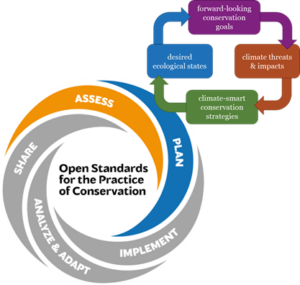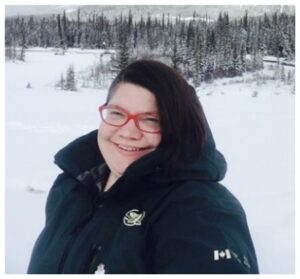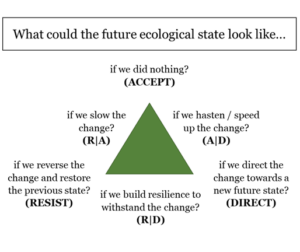Science Advisor, Conservation Planning
Protected Areas Establishment and Conservation | Parks Canada
300 – 300 W Georgia Street
Vancouver, BC V6B 6E1
Tel: 604-358-5999
|
|
Dr. Elizabeth Nelson is a Science Advisor for Parks Canada, enabling climate-smart conservation across Parks Canada’s diverse protected areas. Dr. Nelson is passionate about bringing diverse collaborators together to identify and implement climate change solutions, and she leads multi-disciplinary, multi-jurisdictional discussions and working groups on key conservation priorities. In collaboration with provinces and territories, she developed the Climate Change Adaptation Framework for Parks and Protected Areas (Nelson et al. 2020; https://doi.org/10.5070/P536146399). She is currently applying the Resist-Accept-Direct (RAD) framework to a broad variety of climate-smart conservation planning processes across the Agency (Schuurman et al. 2022; https://doi.org/10.1093/biosci/biab067).
CURRENT RESEARCH INTERESTS
 Identifying desired future ecological states and forward-looking conservation goals that embrace transformational change and accept uncertainty. Working from a series of foundational climate-smart conservation principles, Dr. Nelson is developing tools and resources to identify and implement climate-smart restoration goals and objectives that reflect the range of conservation values held by diverse interest- and rights-holders.
Identifying desired future ecological states and forward-looking conservation goals that embrace transformational change and accept uncertainty. Working from a series of foundational climate-smart conservation principles, Dr. Nelson is developing tools and resources to identify and implement climate-smart restoration goals and objectives that reflect the range of conservation values held by diverse interest- and rights-holders.
 Enabling climate-smart conservation planning using the Open Standards for the Practice of Conservation. Building on her work on the Adaptation Framework for Parks and Protected Areas (Nelson et al., 2020), Dr. Nelson has focused more closely on climate-smart conservation planning, aligning her work with the Open Standards for the Practice of Conservation in collaboration with colleagues from the Foundations of Success, World Wildlife Fund, USGS and more.
Enabling climate-smart conservation planning using the Open Standards for the Practice of Conservation. Building on her work on the Adaptation Framework for Parks and Protected Areas (Nelson et al., 2020), Dr. Nelson has focused more closely on climate-smart conservation planning, aligning her work with the Open Standards for the Practice of Conservation in collaboration with colleagues from the Foundations of Success, World Wildlife Fund, USGS and more.
Identifying climate-smart conservation strategies using the Resist-Accept-Direct framework. Building on her collaboration on the Resist-Accept-Direct (RAD) framework with US National Park Service, USGS, and US Fish & Wildlife (Schuurman et al. 2022), Dr. Nelson is working with conservation practitioners to identify an array of climate-smart conservation strategies that aim towards desired ecological states and align with climate-smart conservation goals, with considerations for monitoring, continuous learning, and adaptive management.

